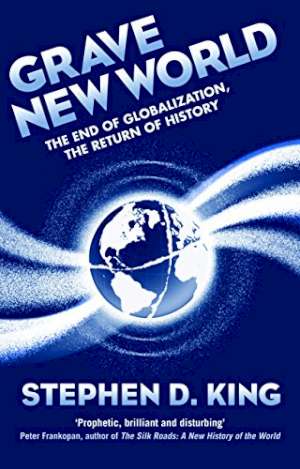11 July 2017
Grave New World
The End of Globalization, the Return of History
Stephen D King
2016, Yale University Press, 304 pages,
ISBN 0300218044
Reviewer: Andrew Sentance, Senior Economic Adviser, PwC

I approached this book with a feeling of trepidation. Stephen King’s previous book When the Money Runs Out was a fairly apocalyptic prognosis for the financial and economic system in the richer western economies. So I was expecting this book – with its morbid title – to make a similarly apocalyptic prediction, not just for the western nations but for the whole world. Like Private Fraser from Dad’s Army, I thought Stephen would be telling us “We’re all doomed!”
But inside the covers of the book, I found more hope and positivity on offer. The book provides a very insightful historical perspective on the phenomenon of globalisation, and highlights the fragility of various previous attempts to link individual countries and states together in a common economic bloc – under the Persian Empire, the Roman Empire, the Ottoman Empire, and in Africa, China and Russia.
King traces the roots of the current globalised economy back to Columbus and the discovery of the New World. His main theme is that the onward march of globalisation is not inevitable. The integrated political and economic systems established in the oriental world, the Islamic world and elsewhere before Columbus did not survive. In addition, there have been frequent setbacks to the process of globalisation in the post-Columbus era. Most recently, the first half of the 20th Century saw two world wars and very depressed and dysfunctional economic conditions in the intervening decades, in the 1920s and 1930s.
The key reason for these globalisation breakdowns, Stephen King argues, is the tension between an integrated global economic system and the power and authority of nation states. In the period since the Second World War, a set of international institutions plus the commitment of the United States, the world’s largest economy, have kept the globalisation project moving forward. The international organisations that have underpinned the current era of global integration include the IMF, the World Bank, the General Agreement on Tariffs and Trade (which morphed into the World Trade Organisation), NATO and the European Union.
But stresses and strains are now emerging in this highly globalised world. There are tensions within the European Union and the UK government is trying to leave. The commitment of the United States to the current world economic order is being questioned under Donald Trump. Immigration and the movement of people are creating social pressures and tensions. Co-ordination and co-operation in the international financial system could not prevent the 2008/9 crisis or guarantee a swift recovery. And there is a dark side to the way in which technology is undermining privacy and providing a platform for cyber-crime.
The final section of the book looks ahead and discusses whether the current globalisation model rooted in the western world can survive these current pressures and challenges. On this issue, Stephen King’s conclusion is nuanced. He does not predict the imminent collapse of the current globalised economic system, but highlights its vulnerabilities. To counter these potential weaknesses, King argues that we need stronger international institutions and a wider range of national sponsors for the current globalised economic system – including China, which is set to become the world’s largest economy some time in the next decade.
Fortunately, China has been one of the major beneficiaries of the current era of globalisation. There are signs that in a whole range of policy areas, including dealing with climate change, China is now becoming much more supportive and engaged in the challenge of sustaining the current world economic system.
Stephen King’s analysis is very illuminating. Globalised economic systems are potentially fragile and vulnerable to disruption. But his book also shows they can also prove durable for many centuries. The final conclusion of Grave New World is not that globalisation is doomed, but that it has to overcome the current set of challenges to survive and deliver future prosperity.
Bolstering our existing international institutions, rather than undermining them, has to be part of this process. And in some areas (such as climate change and challenging cyber-crime) we may need to build new institutions to address 21st Century challenges.
This is a very thought-provoking book, which summons a vast array of historical and economic evidence to support its argument. I wholeheartedly recommend reading it. Then, make up your own mind about how the international system will meet the current challenges to our globalised economic order.
I am a glass half-full person; I think we will weather the current storms. But read the book for yourself and make up your own mind.
